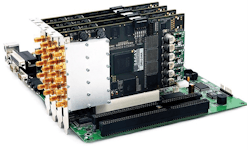Black River eyes enabling technologies in software-defined radio and signals intelligence
ROME, N.Y. — U.S. Air Force researchers needed enabling technologies for software-defined-radio (SDR) signals intelligence for low-power applications in moderate to dense co-channel environments. They found their solution from Black River Systems Co. Inc. in Utica, N.Y.
Air Force researchers are looking to Black River Systems Co. for low-power, software-defined-radio (SDR) signals intelligence in dense co-channel environments.
Officials of the Air Force Research Laboratory Information Directorate, in Rome, N.Y., have announced a $9.3 million contract to Black River for the Signals Intelligence (SIGINT) Software Defined Radio (SDR) project.
Black River experts will help improve Air Force knowledge in the cyber domain by advancing the state of the art in software-defined radio to sustain signals intelligence capabilities, including real-time collection, geolocation, and signal exploitation.
The SIGINT SDR project is to provide game-changing technologies for critical warfighter needs in command, control, communications, cyber, and intelligence (C4I) capabilities with a focus on intelligence and cybersecurity.
The project has two primary thrusts: techniques and algorithms that help identify, collect, process, exploit, and manipulate electronic communication signals in a moderate to dense co-channel environment with potentially significant Doppler effects; and develop capabilities in digital signal processing (DSP) and cyber operations by capitalizing on existing technology.
Black River experts will find ways to detect, identify, characterize, and gelocate emerging communications and low-power signals of interest; develop DSP software for new systems and waveforms; develop software and hardware architectures for standoff collection systems; integrate these capabilities into information operations and collection systems; and characterize cognitive software-defined radios from airborne or ground-based platforms operating in dense-signal environments.
Company experts also will capitalize on existing technologies for DSP and cyber operations to make the most of information from data and signals for warfighters.
The project will involve modifying existing fielded systems with new cyber capabilities, as well as developing an automated signal-processing framework for rapid signal processing and cyber capabilities.
On this contract, Black River will do the work in Utica, N.Y., and should be finished by May 2022.
For more information, contact Black River Co. online at www.blackriversystems.com, or the Air Force Research Lab’s Information Directorate at www.wpafb.af.mil/afrl/ri.

John Keller | Editor
John Keller is editor-in-chief of Military & Aerospace Electronics magazine, which provides extensive coverage and analysis of enabling electronic and optoelectronic technologies in military, space, and commercial aviation applications. A member of the Military & Aerospace Electronics staff since the magazine's founding in 1989, Mr. Keller took over as chief editor in 1995.



